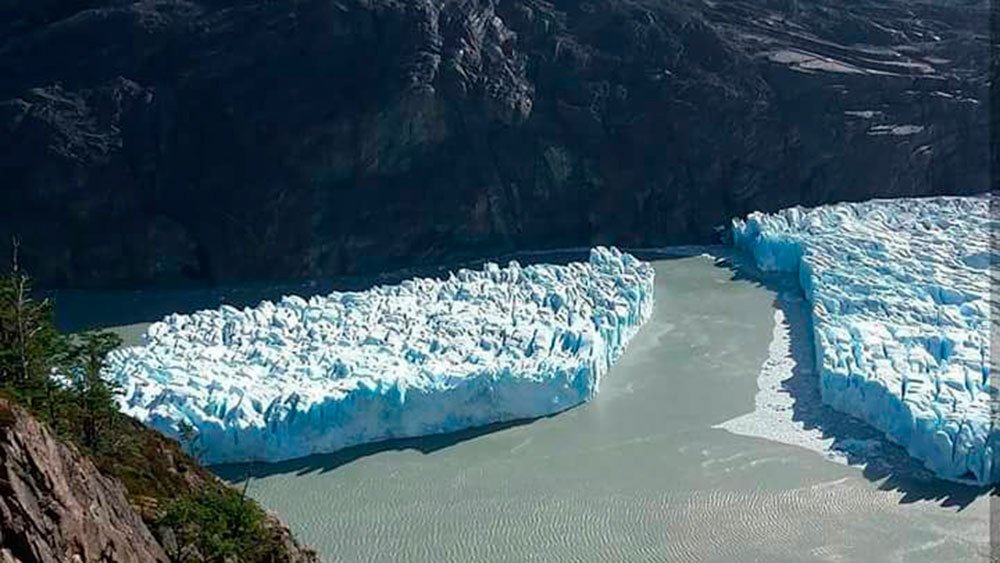
© Pav Jordan / Reuters
Chile’s CONAF forestry service shared the image of the enormous block of blue-white ice, which measures 350 meters (1,148 ft) in length and 380 meters (1,247 ft) in width, as it floated in the glacial lagoon at Torres del Paine National Park.

Desprendimiento en el glaciar Grey. Glaciólogo Ricardo Jaña: El hielo se ve compacto y consistente" https://t.co/WKwwSUtJm7 @Minrel_Chile @MMAChile @conaf_minagri @umagallanes pic.twitter.com/QEG6MwtaCO
— INACH (@inach_gob) November 28, 2017
Park officials told Reuters that such breaks are rare, the last one happened in the early 1990s, adding that the cause of the rupture was still unclear.
However global warming is likely to have contributed to the glacier’s demise, according to Dr. Ricardo Jaña, glaciologist from the Chilean Antarctic Institute (INACH).
Comment
No, global warming (Man Made) did not contribute to the glacier’s demise because (Man Made) Global Warming does not exist according to unaltered, real world, empirical measurements. What this is is something 100% natural, ice breaks off and float of out to the sea. Remember Titanic, it crashed into an iceberg in April 1912, i.e. before i got my first SAAB – where did that iceberg come from?
……………………
Winning: grant applications for ‘climate change’ research are down 40%
Scientists appear to be self-censoring by omitting the term “climate change” in public grant summaries.
An NPR analysis of grants awarded by the National Science Foundation found a steadily decreasing number with the phrase “climate change” in the title or summary, resulting in a sharp drop in the term’s use in 2017. At the same time, the use of alternative terms such as “extreme weather” appears to be rising slightly.

The change in language appears to be driven in part by the Trump administration’s open hostility to the topic of climate change. Earlier this year, President Trump pulled the U.S. out of the Paris climate accord, and the President’s 2018 budget proposal singled out climate change research programs for elimination.
Meanwhile, the Environmental Protection Agency has been systematically removing references to climate change from its official website. Both the EPA’s leader, Scott Pruitt, and Secretary of Energy Rick Perry have said they do not accept the scientific consensus that humans are causing the planet to get warmer.
As a result, many scientists find themselves in an uncomfortable position. They are caught between environmental advocates looking to recruit allies and right-wing activists who demonize researchers and denigrate their work.
“In the scientific community, we’re very cautious people,” says Katharine Hayhoe, the director of the Climate Science Center at Texas Tech. “We tend to be quite averse to notoriety and conflict, so I absolutely have seen self-censorship among my colleagues. [They’ll say] ‘Well, maybe I shouldn’t say it that way, because whatever funding organization or politician or agency won’t appreciate it.’”
The NSF data appears to bear out the change in language. While the number of grants with the term “climate change” in the public summary has dropped, the number of grants with the terms “environmental change” or “extreme weather” has increased slightly. That suggests that, even if research topics remain the same, the words scientists use to describe them may change.
“Scientists I know are increasingly using terms like ‘global change’, ‘environmental change’, and ‘extreme weather’, rather than explicitly saying ‘climate change’,” Jonathan Thompson, the senior ecologist at the Harvard Forest, wrote in an email to NPR. Thompson has been the lead investigator on multiple research projects funded by the NSF in recent years. “This seems to be born out of an abundance of caution to limit their exposure to any political landmines in what is already an extremely competitive process,” he wrote.
Four other climate researchers acknowledged that they had personally removed the term “climate change” from funding proposals or public summaries in the last year, or had advised graduate students who had done so. All were concerned that if they disclosed their names, it could negatively impact their future funding competitiveness.


